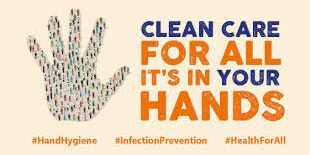May 5th was the World Health organisation’s Save Lives, Clean Your Hands yearly campaign day encouraging better health and wellbeing for people of all ages.
The campaign aims to highlight globally the importance of hand hygiene in the healthcare sector and to bring people together in support of hand hygiene improvement but hand hygiene is important for everybody not just healthcare workers.
A recent study showed 95% of us fail to wash our hands for long enough to kill harmful bacteria, only 2 in 3 people use soap and 1 in 10 people do not wash their hands at all!
Many diseases and conditions are spread by people not washing their hands with soap and clean running water, keeping hands clean is one of the simplest things we can do to avoid getting sick and spreading germs.
Handwashing with soap removes germs from hands. This helps prevent infections because:
- People frequently touch their eyes, nose, and mouth without even realizing it. Germs can get into the body through the eyes, nose and mouth and make us sick.
- Germs from unwashed hands can get into foods and drinks while people prepare or consume them. Germs can multiply in some types of foods or drinks, under certain conditions, and make people sick.
- Germs from unwashed hands can be transferred to other objects, like handrails, table tops, or toys, and then transferred to another person’s hands.
- Removing germs through handwashing therefore helps prevent diarrhoea and respiratory infections and may even help prevent skin and eye infections.
Here is our step by step guide to washing your hands:
- Wet your hands with clean, running water (warm or cold), turn off the tap, and apply soap.
- Lather your hands by rubbing them together with the soap. Be sure to lather the backs of your hands, between your fingers, and under your nails.
- Scrub your hands for at least 20 seconds. Need a timer? Hum the “Happy Birthday” song from beginning to end twice.
- Rinse your hands well under clean, running water.
- Dry your hands using a clean towel or air dry them.





